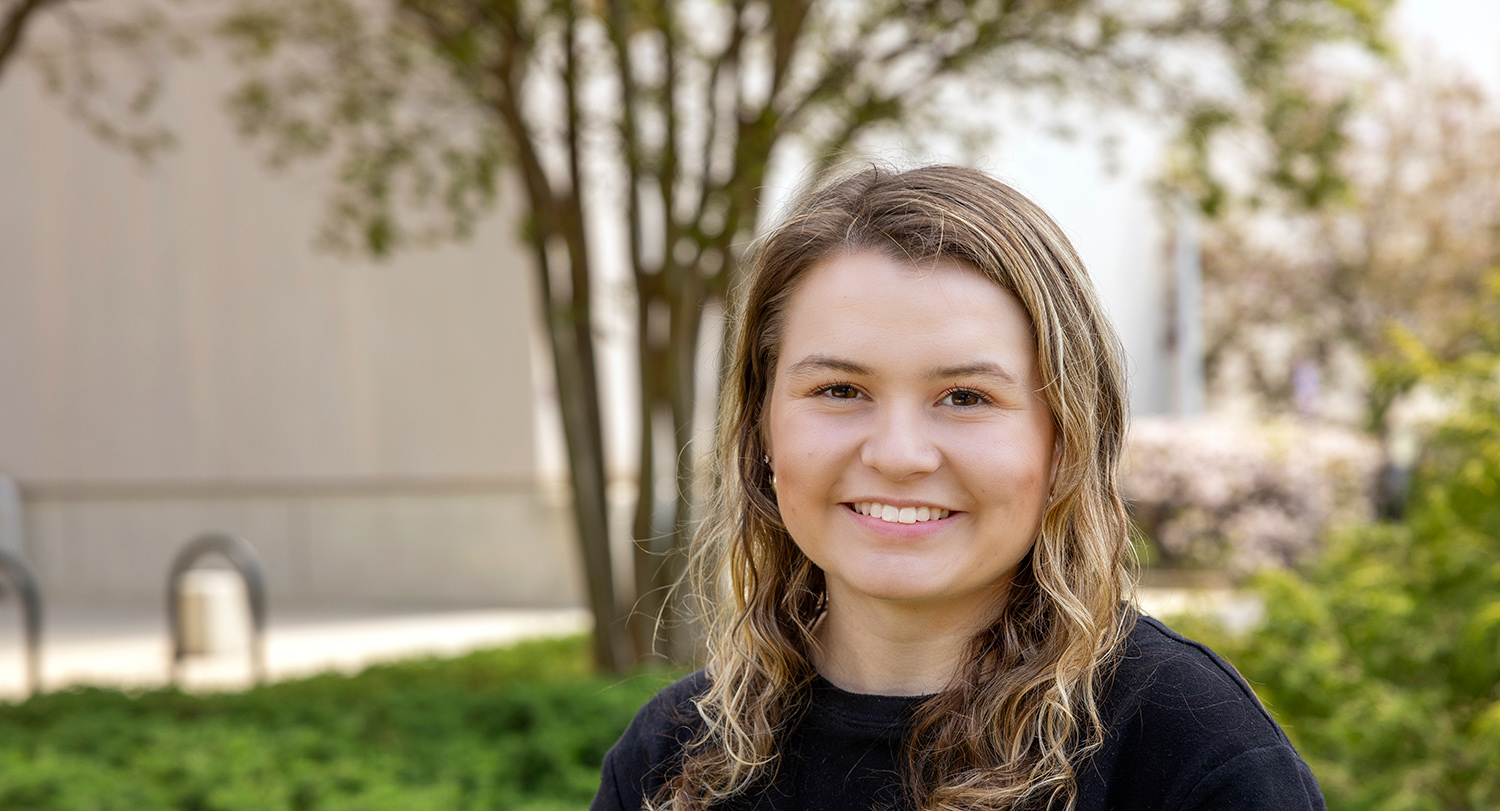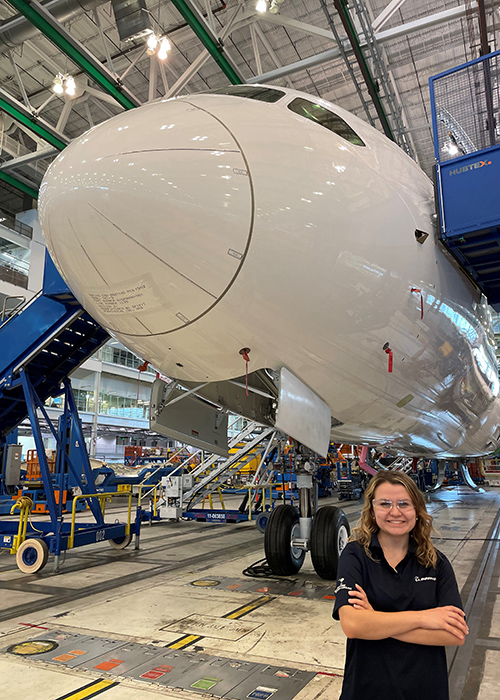
An aerospace engineering major’s commitment to quality is essential. A career in airplane manufacturing means focusing on safety for customers, passengers and pilots.
“Real people are going to be flying on it, and all of their lives matter,” says University of South Carolina College of Engineering and Computing senior Ashley Poyner. “It’s a huge responsibility.”
During her summer internship in 2023, she witnessed diligent attention to detail on the production line at the North Charleston, South Carolina, assembly plant for Boeing, the world’s largest aerospace company.
“If you think something could be wrong, you double- and tripe-check,” Poyner says. “Don’t just say, ‘Oh, it’ll be fine.’ It’s a lot of pressure. But it’s a good challenge.”
Poyner is rapidly learning all about aerospace. As a first-gen student, she is earning her bachelor of science degree in engineering in only three years. A lot of doors also opened thanks to her acceptance into the Boeing Accelerated Leadership Program.
After graduation in May, Poyner’s path will divert for the summer to a Boeing plant in Texas before returning to Columbia to pursue a master’s degree in aerospace engineering.

“In the three years that I’ve been here, there’s so much growth and maturity that happens, not only academically but just as a person,” Poyner says.
“I feel like it’s at least on a weekly basis that I’m like, ‘Oh, my gosh, my life has changed so rapidly.' ”
Prepared for takeoff
Poyner has studied aerospace since she arrived on campus, but her interest was set in motion long ago.
“It’s always fascinated me that you could put something that weighs several tons in the air and it flies,” Poyner says. “It’s still fascinating to me, learning how it works.”
The Goose Creek, South Carolina, native was raised a short distance from Boeing’s aerospace operations in North Charleston where 787s are manufactured. She remembers participating in Boeing’s DreamLearners outreach program in middle school and visiting their facility.
When Poyner first enrolled at USC, the Boeing Accelerated Leadership Program was not yet offered. “The goal, I thought, was going to be to do my four years, get my degree and go work in the industry,” she says.
As a high school senior during the pandemic lockdowns, virtual learning from home became the norm. When funding cuts meant few available AP classes, she was encouraged to take community college dual enrollment classes. This helped get plenty of general education courses out of the way. Upon arriving at USC, she was motivated to take a fuller course load to graduate early.
“I don’t even think I understood the level of work it was going to require when I came into the program,” Poyner says. “The bare minimum doesn’t really cut it for an engineering degree. But hard work always pays off.”
The Boeing Accelerated Leadership Program came into the picture during the first semester of her sophomore year. South Carolina is one of six schools in the nation where it is offered, and the rewards for engineering students are many:
- Paid tuition for junior and senior years
- Two paid summer internships
- Part-time employment as a student
- Networking opportunities with executives
- Consideration for full-time employment for three years after graduation
Poyner applied not because she thought she would get accepted but because she figured the interview process would help prepare her for future job pursuits. When she both got accepted and it became clear she was on track to graduate early, she proposed to stay on campus an extra year and earn a master’s degree so she could complete the leadership program.
“Everyone was extremely supportive,” Poyner says of the arrangement.
Quality is the standard
Poyner’s first Boeing internship centered on manufacturing engineering for engines in North Charleston.
She ran product tests alongside a mentor engineer to collect and analyze data for safety. If anything comes into question during a manufacturing investigation, quality is closely reviewed, and parts are fixed or replaced.
“Along the production line, whether it be a scratch or a dent, they’re looking for anything that doesn’t conform to the standards, and there’s pretty clear-set standards,” Poyner says.
During her time, she learned how many specific roles there were to play.
It’s always fascinated me that you could put something that weighs several tons in the air and it flies. It’s still fascinating to me, learning how it works.
“There’s so many types of engineering, even within aerospace, I had no idea,” Poyner says. “I thought an aerospace engineer was an aerospace engineer.”
To help interns sort through career options, they were encouraged to look up managers and schedule meetings to talk about their areas. Poyner’s connection with one manager who caught her attention led to further summer plans for after graduation.
“She said that she had an opening for an intern,” Poyner said. “So I’ll be going to San Antonio for flight test engineering.”
Peer encouragement
USC is home to the state’s only aerospace engineering undergraduate program, and aerospace majors are a tight-nit community.
“All of these people are so driven and so smart,” Poyner says. “There’s so much knowledge. And there’s so much that you can learn from somebody who is doing something different from you.”
Weekly research meetings attract all students from undergrad to those in the final year of a Ph.D.
“I feel like my peers push me to be better in different ways,” Poyner says. “I wouldn’t say it’s necessarily competitive. But, definitely, there is a push for you to be better.”
Along with the teaching moments of the research meetings, there are one-on-one meetings for faculty feedback.
“It’s not about just typing in numbers and seeing what gets sent back to you,” Poyner says of the lab work. “It’s about do you really understand what’s going on? And how do you get the information that you’re looking for.”
Flying into the future
Poyner’s summer in San Antonio will center on flight test engineering, where everything on an aircraft is examined and certified before it can be sent to a customer.
Meanwhile, she finds herself at a time where she can reflect on her own potential flight paths.
“Once you get to this point, there’s so many different directions your life can go,” Poyner says. “Now that I have accepted a job somewhere that I never thought I’d be living, I think I would have been much more open to taking more risks and trying different things.”
Her master’s research involves the chemical kinetics of ethanol, which is different from anything she does with aerospace.
“I like chemistry, I enjoy it,” she says. “It’s not super-related to what I’ll be doing at Boeing, especially not this summer, but I could definitely see it applying in the future if I change positions.”
Her advice to other first-gen students is to be humble and to be curious about other people’s experiences.
Her mother and father, who both work for a family roofing company in the Goose Creek area, had offered hints of what new experiences could entail.
“My parents said that I’m their child that they had to push out of the nest. And they knew once I was forced out of the nest, then I’d be fine.”
That includes being comfortable with the idea that you could make mistakes along the way.
“I tend to be someone that usually has her heart set on something and what I’m going to do to get there,” she says. “But there’s so many opportunities that you can miss. And just being willing to take a chance to try something new, move somewhere different. It might surprise you.”